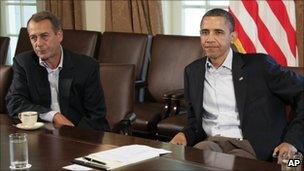IMF calls for US to raise debt ceiling and cut spending
- Published
- comments

House Speaker Boehner (left) and President Obama have been unable to agree on federal spending
The International Monetary Fund (IMF) has called on US politicians to act urgently to raise the country's debt ceiling.
The IMF also called for a "comprehensive solution" to reduce the US deficit over the medium term.
Without this, IMF directors warned, the markets could lose confidence in Washington's ability to pay its debts.
The US risks default on its $14.3tn (£8.7tn) debt without a deal to raise the borrowing limit by 2 August.
"These risks would also have significant global repercussions, given the central role of US Treasury bonds in world financial markets," the IMF said.
Competing plans
"Directors [on the IMF board] highlighted the urgency of raising the federal debt ceiling and agreeing on the specifics of a comprehensive medium-term consolidation programme," the IMF said as part of its review of the US economy.
Clinton says she is sure Congress 'will do the right thing'
It went on to call for specific actions to reduce spending - an area of intense debate between the Republicans and Democrats over how to cut the deficit.
"The strategy should include entitlement reforms, including additional savings in healthcare, as well as revenue increases," it said.
But warning that US growth was likely to remain subdued over the medium term, the IMF advised against fast cuts which could impact on consumer spending.
Later on Monday, Republican House Speaker John Boehner and Democratic Senate Majority leader Harry Reid were unveiling separate deficit reduction plans with their respective House and Senate caucuses.
Aides said Mr Boehner's plan included $1.2tn in cuts and spending caps, along with a $1tn debt ceiling increase.
It would also include a second debt limit increase through 2012 contingent on cuts in the health programmes for the poor and elderly, news media reported.
Mr Reid's proposal was said to include $2.7tn in spending cuts.
Nervous investors
Mr Obama meanwhile dropped two fundraising events in Washington scheduled for Monday evening so that he could focus on the debt issue, US media said.
He told a Hispanic civil rights convention earlier in the day that the US could not solve its budget problem solely by reducing spending.
"We can't just close our deficit by cutting spending," Mr Obama said, adding that revenue increases were also necessary.
Global markets were down slightly on Monday amid concerns about a lack of a deal as the 2 August deadline looms.
If the ceiling is not raised, the US Treasury could run out of money to pay all of its bills - which could lead to interest rate rises, threaten the US economy and in turn the global recovery.
US Secretary of State Hillary Clinton has said she is "confident" Congress will reach a deal to raise the US debt ceiling.
"Let me assure you we understand the stakes. We know how important this is for us and how important it is for you," Mrs Clinton told Hong Kong business leaders.
Mr Obama was joined by congressional leaders at the White House again on Saturday, but the deadlock continued.
On Friday, negotiations between Mr Obama and Mr Boehner collapsed, with each side blaming the other.
The US federal government is running a large budget deficit - equal to $1.3tn, or more than $4,000 per person, during the 12 months to June this year.
Mr Obama and fellow Democrats have been seeking a deal with Republicans, who control the House of Representatives, to cut the annual budget deficit in return for a rise in the total debt ceiling.
Mr Obama wants the debt reduction deal to include a combination of spending cuts and tax rises, but Republicans in both houses of Congress are strongly opposed to the latter.
Democrats, meanwhile, are against any cuts to healthcare and welfare programmes for pensioners and the poor.
